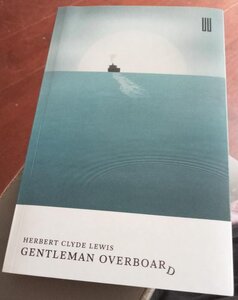Earlier this year, I read Appius and Virginia by Gertrude Trevelyan, which had found its way back into print thanks to Brad Bigelow from the Neglected Books Page. Brad also has an ongoing series with Boiler House Press, Recovered Books, which aims to bring back more ‘forgotten’ titles.
The first entry in the Recovered Books series was Gentleman Overboard, a short novel originally published in 1937 and written by an American journalist, Herbert Clyde Lewis (1909-50). Lewis introduces us to Henry Preston Standish: a 35-year-old New York businessman, materially comfortable but with a nagging feeling that something is missing in his life.
Standish leaves behind his wife and young daughter to take a trip on a steamship. He’s on deck early one morning when, unseen, he slips on a spot of grease and falls into the Pacific. In this situation, Lewis puts Standish and his sense of self under the microscope. Standish’s immediate emotion on falling overboard is shame, because this is not the sort of thing that should happen to someone like him:
Men of Henry Preston Standish’s class did not go around falling off ships in the middle of the ocean; it just was not done, that was all. it was a stupid, childish, unmannerly thing to do, and if there had been anybody’s pardon to beg, Standish would have begged it.
At first, Standish’s sense of decorum remains, but the reality of his predicament eventually hits home. He starts removing his outer clothes to stay afloat, and abandoning the contents of his wallet. The layers of his genteel life are literally stripped away.
Lewis combines contradictory tones in a way I found quite powerful: Gentleman Overboard is both comic and tragic, banal and affecting. For example here’s a passage where Standish reflects on what might be lost if he were to drown:
There would be voids everywhere through no fault of his. A void in the elevator boy’s pocket next Christmas, a void in the telephone book, a void on the office stationery…New York City would be dotted with spaces that could never be filled by anyone but the real Henry Preston Standish; his locker at the Athletic Club, the hollow in his bed, the interior of his dinner jacket, to mention just a few.
There is something absurd in the small scope of what Standish describes here. But when I think about it, it seems to me that this captures something of what life is like. Yes, in the broader picture, one human life may be insignificant; but on an individual scale, even the smallest things can carry meaning. Lewis holds these contradictions in a finely balanced tension.

Recent Comments